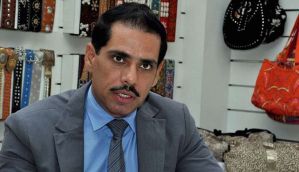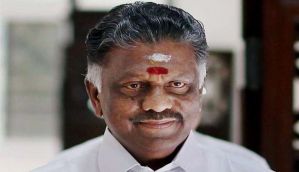World Environment Day: PM Modi calls on nation to keep Earth clean
To mark World Environment Day on 5 June, Prime Minister Narendra Modi asked the nation to take a pledge to collectively work towards conserving the environment resources, adding that the Earth should be kept clean and green. In a series of tweets, Prime Minister Modi said that this day was a commitment to protect the environment and live in harmony with the nature.
"On World Environment Day, let us pledge to collectively work towards conserving precious environment resources... Let us live in harmony with Mother Nature and keep our beloved Earth clean and green.
Jat quota stir: Security beefed up in Haryana ahead of 2nd round of protests
Asserting that Chief Minister Manohar Lal Khattar-led government will not spare anyone who will meddle with the law and order situation in the state, former Officer on Special Duty (OSD) to Haryana state chief Jawahar Yadav on Sunday said that peaceful protest by the Jat Community is welcome, but any nuisance will not be tolerated.
Fifty five paramilitary forces have been deployed in all districts of the state ahead of the agitation. Section 144 against unlawful gatherings has also been imposed in Jhajjar, Sonipat, Rohtak, Panipat, Hisar, Fatehabad, Jind and Kaithal which also covers national highways. A dedicated helpline has been provided which will be monitored by a control room in Chandigarh round-the-clock. The administration has also issued order banning mobile internet service.
17 killed in accident on Mumbai-Pune expressway
Seventeen people were killed and around 33 were left injured when a luxury bus rammed into two cars and then fell into a ditch on the Pune-Mumbai corridor expressway on 5 June.
The deceased include 13 males and four females. The driver of a swift desire car was changing a punctured tyre and an Innova stopped to help him.Tragedy struck when a bus coming from Satara collided with both the cars and then fell into a 20 feet ditch on the left side of the road.
Four Indian fishermen apprehended by Lankan Navy
As many as four Indian fishermen and one boat were apprehended by the Sri Lankan Navy at Neduntheevu in early morning of 5 June.
The apprehended fishermen were handed over to Sri Lankan fisheries department in Kankesanthurai. On 4 June, Tamil Nadu Chief Minister J Jayalalithaa wrote to Prime Minister Narendra Modi urging him to help release the four Indian fishermen, who were arrested by the Sri Lankan Navy earlier on Thursday.
Probe into Mathura violence begins today
The probe ordered by Uttar Pradesh Chief Minister Akhilesh Yadav into the violence at the Jawahar Bagh of Mathura, will begin on 5 June, as the Presiding officer of the high power administrative probe committee and Commissioner of Aligarh, Chandrakant will first visit the spot and take stock of the situation.
The Commissioner said that if somebody wants to present any evidence or information on the incident, he will be heard.
Meanwhile, Ram Vriksh Yadav, said to be the leader of the Mathura cult, has been declared dead.
Op blue star anniversary: SGPC chief rubbishes 'media ban' reports inside Golden Temple
On 5 June, the Shiromani Gurdwara Parbandhak Committee (SGPC) rubbished rumours that the media has been banned from entering the Golden Temple on the occasion of the 32nd Operation Blue Star Anniversary on 6 June.
SGPC president Avtar Singh Makkar said that press is allowed to do its job inside the Gurudwara. "The day is of crucial significance and I urge all to maintain peace. Action will be taken against the miscreants. And as far as notice against the entry of the press is concerned, we have not issued any such notice and we will take action against those who have done this. I just request the press not to create any sort of unrest, rest the media is allowed to do their work," he told ANI.
Kejriwal reiterates call to book Eknath Khadse under sedition
Extending his full support to Patidar quota agitation leader Hardik Patel, who has been in prison for almost eight months on charges of sedition, Delhi Chief Minister Arvind Kejriwal on Sunday reiterated his demand to book Maharashtra Minister Eknath Khadse under sedition, as he is facing charges of impropriety and alleged links with underworld don Dawood Ibrahim.
"Gujarat govt shud withdraw sedition charges against Hardik Patel. He is not guilty of sedition. Khadse is. Book khadse under sedition," Kejriwal said in a tweet.
"Now, there is a Maharashtra Minister, Khadse sahib. His alleged conversation with Dawood Ibrahim, who is the enemy of the nation, came to light. That way Khadse is 'deshdrohi', but government takes no action, instead, it takes action against Hardik Patel," he added.
On 4 June, Khadse resigned from his post following allegations of impropriety with regard to a land deal and alleged calls from underworld don Dawood Ibrahim.
In a first, hydrogen signal detected from galaxy far, far away
An international team of astronomers smashed cosmic records to see hydrogen in a galaxy more than five billion light years away.
"Due to the upgrade of the Very Large Array, this is the first time we've been able to directly measure atomic hydrogen in a galaxy this far from Earth," lead author, Dr Ximena Fernandez from Rutgers, the State University of New Jersey, said.
Fernandez added that these signals would have begun their journey before our planet even existed and after five billion years of travelling through space without hitting anything, they have fallen into the telescope and allowed the astronomers to see this distant galaxy for the very first time. The study appears in Astrophysical Journal Letters.
Bionic leaf brings next-gen biofuels closer to reality
Soon, solar fuel-powered cars could be hitting the roads, thanks to the new bionic leaf that can make burnable liquid fuel out of sunlight.
Harvard engineer Daniel Nocera and biochemist Pamela Silver co-created a system that uses solar energy to split water molecules and hydrogen-eating bacteria to produce liquid fuels.
"This is a true artificial photosynthesis system," Nocera said. "Before, people were using artificial photosynthesis for water-splitting, but this is a true A-to-Z system, and we've gone well over the efficiency of photosynthesis in nature... In principle, we have a platform that can make any downstream carbon-based molecule. So this has the potential to be incredibly versatile"
Dubbed "bionic leaf 2.0," the new system builds on previous work by Nocera, Silver and others, which, though it was capable of using solar energy to make isopropanol, faced a number of challenges. The system can now convert solar energy to biomass with 10% efficiency, Nocera said, far above the 1% seen in the fastest growing plants.
India needs to up family planning budget, says study
India needs to significantly increase its budget for the family planning sector if it doesn't want to miss the goal it pledged it will reach at FP2020, the global partnership for protection of reproductive rights of women and girls, suggests a new study.
The study by the Population Foundation of India (PFI), a think tank on population and development issues, shows that if India wants to meet its FP2020 pledge of covering 48 million new users by that year, it would need to spend about Rs 15800 crores, if not more, during 2013-2020.
The states that need a greater focus and commitment are the 8 Empowered Action Group states of Bihar, Jharkhand, Madhya Pradesh, Chhattisgarh, Odisha, Rajasthan, Uttar Pradesh and Uttaranchal as well as Assam and Himachal Pradesh.
The research noted that family planning, which is almost fully funded by the central government, has received very little attention from it as compared to other health programmes.
Body's own defense against Zika found
A team of scientists has offered the first look at how our cells can "swallow up and quarantine" Zika, defending themselves against the virus' attack.
Eight weeks after receiving their first samples of Zika virus, the University of Massachusetts Medical School (UMMS) researchers have shown that a very small protein we all have in our bodies, interferon-induced protein 3 (IFITM3), can dramatically reduce the ability of Zika virus to infect human and mouse cells. In some cases, IFITM3 can also prevent Zika virus from killing our cells.
The findings, by senior author Abraham Brass, suggest that boosting the actions of IFITM3 may be useful for inhibiting Zika virus and other emerging viral infections.
Brass noted, "Our results show that Zika virus has a weakness that we could potentially exploit to prevent or stop infection."
While relatively rare in people of European decent, this IFITM3 variant is more common in Asia and Micronesia.
First author George Savidis said, "In effect, we see that IFITM3 allows our cells to swallow up and quarantine the virus thereby stopping their own infection, and also the infection of neighboring cells. We think this also reduces the levels of cell death caused by Zika virus."







![BJP's Kapil Mishra recreates Shankar Mahadevan’s ‘Breathless’ song to highlight Delhi pollution [WATCH] BJP's Kapil Mishra recreates Shankar Mahadevan’s ‘Breathless’ song to highlight Delhi pollution [WATCH]](https://images.catchnews.com/upload/2022/11/03/kapil-mishra_240884_300x172.png)

![Anupam Kher shares pictures of his toned body on 67th birthday [MUST SEE] Anupam Kher shares pictures of his toned body on 67th birthday [MUST SEE]](https://images.catchnews.com/upload/2022/03/07/Anupam_kher_231145_300x172.jpg)






